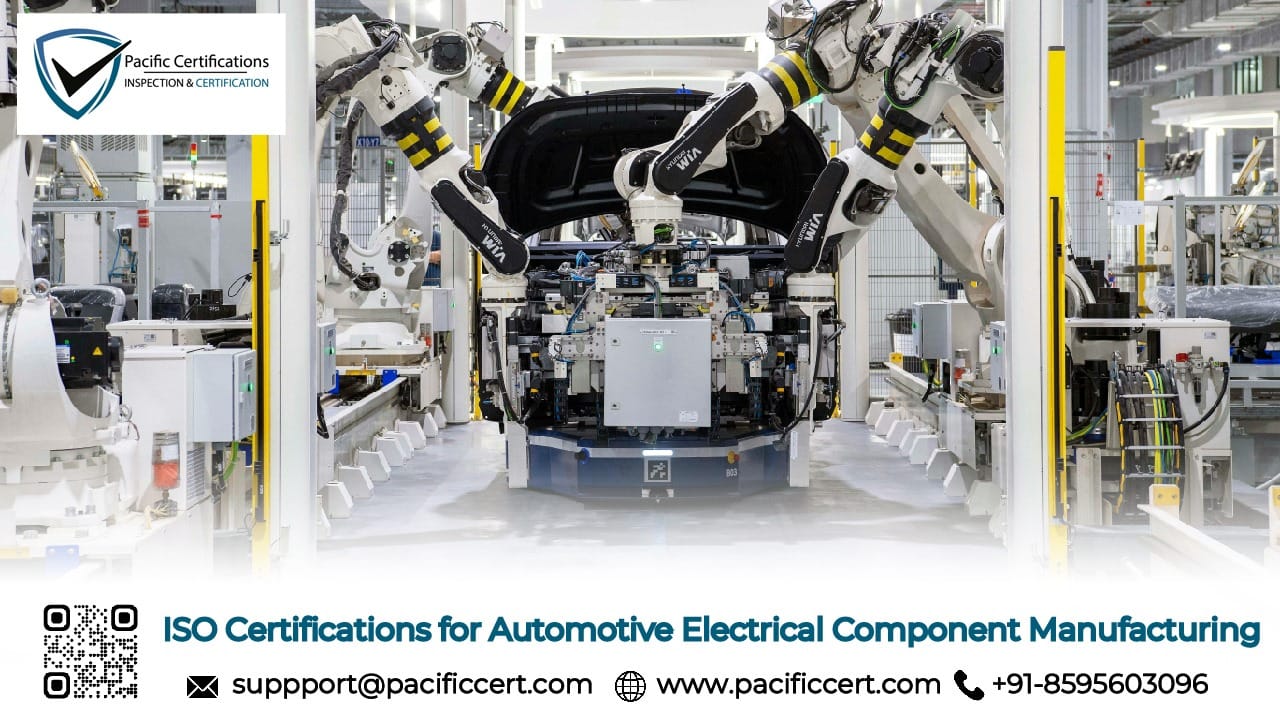ISO Certifications for Automotive Electrical Component Manufacturing Businesses, Requirements and Benefits

ISO Certifications for Automotive Electrical Component Manufacturing
The automotive industry relies on safety and consistent quality to meet the evolving demands of modern transportation. Electrical components such as sensors, wiring harnesses, batteries, and control modules play a critical role in the performance of vehicles.
With these high stakes, manufacturers of automotive electrical components need to ensure quality and safety at every stage of production.
ISO certifications offer globally recognized frameworks for standardizing processes, improving quality management and ensuring that products meet regulatory requirements. Automotive electrical component manufacturers increasingly turn to ISO standards to remain competitive in a highly regulated market while delivering reliable, safe, and sustainable products.
If you're pursuing ISO certification for automotive electrical component manufacturing, contact us at [email protected] for expert assistance!
Applicable ISO Standards for Automotive Electrical Component Manufacturing
Several ISO standards are relevant to automotive electrical component manufacturing, each covering specific aspects. Here are the key ISO standards that apply:
ISO 9001:2015 – Quality Management System (QMS)
ISO 9001 is the most widely recognized standard for quality management. It ensures that manufacturers establish efficient processes to meet customer expectations and regulatory requirements. In the automotive sector, it promotes consistency and continuous improvement, making it a core requirement for most component suppliers.
IATF 16949 – Automotive Quality Management System
While technically not an ISO standard, IATF 16949 builds upon ISO 9001 with additional requirements tailored specifically to the automotive sector. It focuses on reducing defects, improving traceability, and driving process improvements in the supply chain.
ISO 14001:2015 – Environmental Management System (EMS)
ISO 14001 ensures that companies actively manage their environmental impacts by reducing waste, conserving resources, and complying with environmental regulations. For electrical component makers, this can involve adopting eco-friendly materials and improving energy efficiency.
ISO 45001:2018 – Occupational Health and Safety Management
ISO 45001 focuses on ensuring safe working conditions and minimizing risks to employee health and safety. Automotive electrical component manufacturing involves potentially hazardous processes like soldering, handling chemicals, and machine operation, making compliance with this standard crucial.
ISO 26262 – Functional Safety for Road Vehicles
With the rise of electric vehicles (EVs) and autonomous driving systems, the safety of automotive electrical components is paramount. ISO 26262 outlines safety requirements for electrical and electronic systems used in vehicles. Compliance with this standard ensures that critical components like sensors and control units meet functional safety expectations.
Click here to find out more applicable standards to your industry
For ISO certification tailored to automotive electrical components, connect with us at [email protected] or dial +91-8595603096 today!
At Pacific Certifications, we specialize in auditing and issuing ISO certifications for automotive electrical component manufacturers. Whether your organization is pursuing ISO 9001, ISO 14001, IATF 16949, or ISO 45001, our team offers a seamless certification process to help you meet industry standards.
Our certification experts perform independent audits to ensure that your processes align with the chosen ISO requirements, giving your business a competitive edge.
Reach out to Pacific Certifications for ISO certification services at [email protected] or call us at +91-8595603096 to get started.
Requirements of ISO Certifications for Automotive Electrical Component Manufacturing
Each ISO standard has specific requirements that manufacturers need to follow. Below are some critical elements that automotive electrical component manufacturers must consider:
ISO 9001 / IATF 16949
- Documented quality policy and objectives
- Process mapping and continuous monitoring
- Supplier management and control
- Risk-based thinking and preventive actions
- Traceability of materials and components
ISO 14001
- Identification of environmental aspects and impacts
- Energy usage monitoring and reduction strategies
- Waste management protocols
- Legal compliance with environmental regulations
- Setting environmental objectives and performance tracking
ISO 45001
- Health and safety risk assessments
- Implementation of emergency preparedness plans
- Clear communication on safety policies to employees
- Regular safety audits and inspections
- Incident reporting and corrective actions
ISO 26262
- Risk assessment of electrical components in safety-critical applications
- Development of safe system designs for vehicles
- Documentation of safety life cycle processes
- Verification and validation of components against functional safety requirements
Compliance with these requirements ensures that manufacturers align their operations with best practices and maintain the highest safety and quality standards.
Secure ISO certification for your automotive electrical components—email us at [email protected] or call +91-8595603096 now.
Benefits of ISO Certifications for Automotive Electrical Component Manufacturing
ISO certifications provide numerous benefits that enhance competitiveness and operational efficiency in the automotive sector. Here are the key advantages:
Product Quality: ISO standards like ISO 9001 ensure consistent quality across the production process. For automotive components, this means fewer defects and greater reliability, leading to customer satisfaction.
Access to Global Markets: Automotive OEMs (Original Equipment Manufacturers) and Tier-1 suppliers often require ISO-certified suppliers. Having certifications like IATF 16949 allows manufacturers to access contracts from leading automakers and expand into international markets.
Compliance: Manufacturers of electrical components must comply with numerous safety, environmental, and quality regulations. ISO certifications provide a structured framework to ensure compliance with these requirements.
Risk Management: ISO 45001 and ISO 26262 certifications ensure safe work environments and functional safety in electrical systems. This reduces the risk of accidents, both within manufacturing facilities and in end-use applications.
Sustainability and Cost Savings: ISO 14001 encourages resource efficiency, waste reduction, and eco-friendly practices. These measures not only benefit the environment but also lead to long-term cost savings through improved operational efficiency.
ISO certifications play a pivotal role in ensuring the quality, safety, and sustainability of automotive electrical components. With global market trends shifting towards electric and autonomous vehicles, manufacturers must stay ahead by adopting ISO standards like IATF 16949 and ISO 26262.
Contact Pacific Certifications at [email protected]or call +91-8595603096 to kick off your ISO certification journey today!
Market Trends
The automotive sector is undergoing significant changes in 2025, with trends like electrification, autonomous driving, and stricter environmental regulations reshaping the market. Automotive electrical component manufacturers are experiencing increased demand for innovative products such as high-voltage batteries, smart sensors, and control units.
According to recent research, the global automotive component manufacturing market is projected to grow steadily, driven by the adoption of electric vehicles (EVs) and advanced driver assistance systems (ADAS). In response to these trends, more manufacturers are pursuing ISO certifications, including ISO 26262, to ensure their products meet emerging safety requirements.
The emphasis on sustainability is also growing. As governments and consumers push for eco-friendly solutions, manufacturers are adopting ISO 14001 to demonstrate their commitment to environmental responsibility. Staying compliant with ISO standards will be crucial for companies looking to remain competitive in this dynamic industry landscape.
Conclusion
If you are ready to enhance the quality and sustainability of your automotive electrical components, obtaining ISO certifications is the best way forward. At Pacific Certifications, we specialize in helping manufacturers achieve compliance with internationally recognized standards.
Pacific Certifications is accredited by ABIS, in case you need support with ISO certification for your Automotive Electrical Component Manufacturing business, please contact us at [email protected] or +91-8595603096.
Contact Us
At Pacific Certifications, we are committed to helping manufacturers achieve their certification goals through thorough and professional audits. Our expertise ensures that you meet the highest industry standards, giving your business a competitive edge.
ISO Certification Made Easy! For professional certification services in automotive electrical manufacturing, email us at [email protected].
Ready to get ISO certified?
Contact Pacific Certifications to begin your certification journey today!
Suggested Certifications –
Read more: Pacific Blogs

